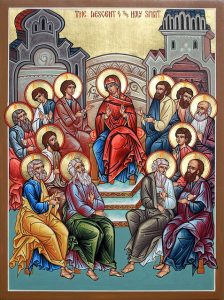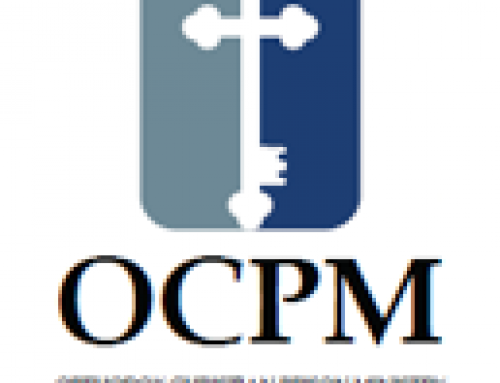This post was originally published on this site
“O Heavenly King, the Comforter, the Spirit of Truth, who art in all places and fillest all things, Treasury of blessings and giver of life: come and dwell in us, cleanse us from every stain, and save our souls, O gracious Lord.”
You may have heard this prayer before, but have you ever taken a second to think about who it is to? We have prayers to God (as a Trinity and in His various Persons), the Theotokos, and various saints: which one is this? As it turns out, this is the only prayer in Orthodoxy (as far as I know) to the Holy Spirit. Let’s break it down.
Of course, I am not an expert on this prayer. I have done no additional research on it for the sake of this article.
Everything I am about to say is stuff that I have learned or thought through, so I strongly encourage you to enhance your knowledge of this prayer by discussing it with a priest and thinking about it on your own.
There are two halves to this prayer. The first half outlines who the prayer is to, the second outlines the request (before adding more about who the prayer is to). The opening line are all phrases that Jesus uses for the Holy Spirit. He tells his disciples multiple times that He will send them “the Comforter,” instructing them to remain in Jerusalem until He does. In fact, one time He goes as far as to tell them that it was good that He was leaving them, because if He had remained on earth, the Comforter would not have come. He also refers to the Holy Spirit as the Spirit of Truth in the Gospels.
We go on to say that this Comforter and Spirit of Truth is in all places and fills all things. This is critical in the Orthodox understanding of the Kingdom of God and salvation, and it influences Orthodox architecture.
Let’s suppose for a moment that the purpose of life is to be where God is, and let us suppose that God is in heaven. Therefore, the purpose of life must be to get to heaven so that we can be with God. If we believe that God is in all places, this is problematic because God is already here. God is already present with us, wherever we are, whatever we are doing. We don’t need to get to some other place to be with Him. What does that mean about heaven? Well, it means that we get to live out the Kingdom of God here on earth by connecting ourselves to the God who surrounds us, filling all things. This is why Orthodox churches have domes, showing the encompassing presence of God, rather than steeples pointing to some place where we presume He is.
I know there is still more to unpack in the first half, but I don’t know enough to talk about it, so let’s move on to the second half. What are we asking this omnipresent Comforter, this Spirit of Truth? It looks to me like an invitation. We are simply saying: come, be with us. Whatever we are doing right now, come be a part of it so that what we do may become sanctified. Come live in me, that I may learn to live in you.
We get to live out the Kingdom of God here on earth by connecting ourselves to the God who surrounds us, filling all things.
– Click here to tweet this quote!
One last thought about this prayer: remember it when Pascha comes around, because you will notice that we don’t say it any more. Once Christ is risen, He is with us. Like He said, the Comforter need not come while He’s here. After His ascension, we stop singing Christ is Risen, but we still don’t add this prayer back in. We wait 10 more days until the day of Pentecost, when the Comforter comes. On that day, that prayer is more powerful than ever, as for the first time in 50 days, we as a Church come together and ask the Holy Spirit to “come and dwell in us, cleanse us from every stain, and save our souls, O Gracious Lord.”
May this prayer have new meaning to us whenever we say it, and may we remember it whenever we are doing anything for which we could use the Spirit’s guidance. May the Holy Spirit guide us all in this effort.





